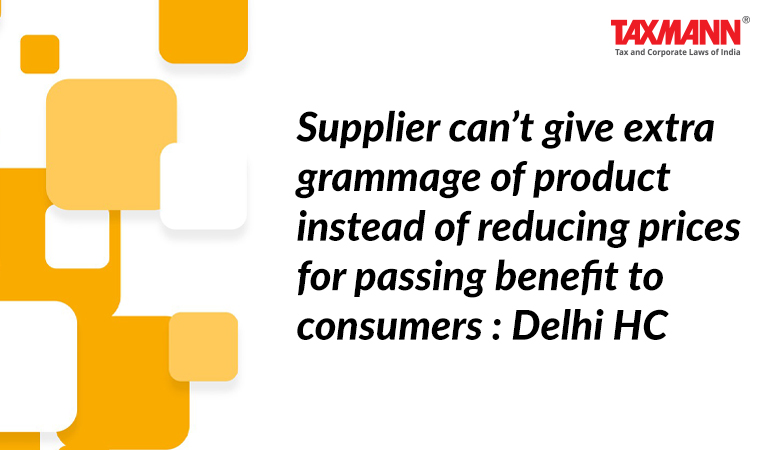Supplier can’t give extra grammage of product instead of reducing prices for passing benefit to consumers: Delhi HC
- Blog|News|GST & Customs|
- 2 Min Read
- By Taxmann
- |
- Last Updated on 14 October, 2022

Case Details: L'Oreal India (P.) Ltd. v. Union of India - [2022] 143 taxmann.com 131 (Delhi)
Judiciary and Counsel Details
-
- Manmohan & Dinesh Kumar Sharma, JJ.
- Mukul Rohatgi, Sr. Adv. V. Lakshmikumaran, Karan Sachdev & Agrim Arora, Advs. for the Petitioner.
- Ms Uma Prasuna Bachu, Zoheb Hossain, Sr. Standing Counsel Vivek Gurnani & Ms Niharika Kuchhal for the Respondent.
Facts of the Case
The National Anti-Profiteering Authority (NAA) found that the petitioner had not only collected excess base prices from his customers after reduction in rate of tax but also compelled them to pay additional GST. The petitioner contended that instead of reducing prices, it had given extra grammage of product. However, the NAA directed the petitioner to deposit profiteered amount as it denied the benefit of tax reduction to the ordinary buyers by charging excess GST. The petitioner filed writ petition against the same.
High Court Held
The Honorable High Court observed that the petitioner had not only collected excess base prices from his customers after reduction in rate of tax but also compelled them to pay additional GST and thereby failed to grant commensurate reduction in prices.
Under Section 171 of CGST Act, 2017, any benefit of reduction in rate of taxes or benefit of input tax credit on any supply of goods or services can only be by way of commensurate reduction in prices. The Court noted that when a statute clearly provides for a manner in which something is to be done, and a duty is cast upon supplier to extend benefit of rate reduction by way of commensurate reduction in prices, then the supplier can’t insist that instead of reducing prices, he will give extra grammage of product.
Therefore, the Court held that the petitioner had acted in contravention of provisions of section 171(1) and directed to deposit principal profiteered amount after deducting GST imposed on net profiteered amount in six equated instalments.
Disclaimer: The content/information published on the website is only for general information of the user and shall not be construed as legal advice. While the Taxmann has exercised reasonable efforts to ensure the veracity of information/content published, Taxmann shall be under no liability in any manner whatsoever for incorrect information, if any.

Taxmann Publications has a dedicated in-house Research & Editorial Team. This team consists of a team of Chartered Accountants, Company Secretaries, and Lawyers. This team works under the guidance and supervision of editor-in-chief Mr Rakesh Bhargava.
The Research and Editorial Team is responsible for developing reliable and accurate content for the readers. The team follows the six-sigma approach to achieve the benchmark of zero error in its publications and research platforms. The team ensures that the following publication guidelines are thoroughly followed while developing the content:
- The statutory material is obtained only from the authorized and reliable sources
- All the latest developments in the judicial and legislative fields are covered
- Prepare the analytical write-ups on current, controversial, and important issues to help the readers to understand the concept and its implications
- Every content published by Taxmann is complete, accurate and lucid
- All evidence-based statements are supported with proper reference to Section, Circular No., Notification No. or citations
- The golden rules of grammar, style and consistency are thoroughly followed
- Font and size that’s easy to read and remain consistent across all imprint and digital publications are applied



 CA | CS | CMA
CA | CS | CMA
